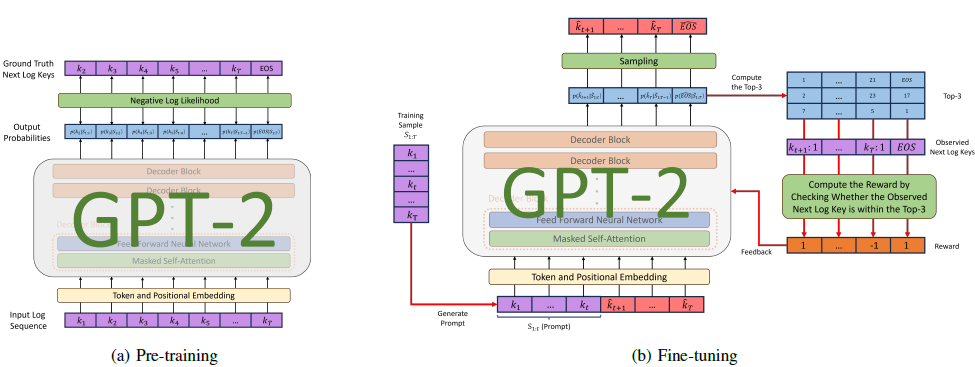This repository contains a Pytorch implementation of LogGPT, a novel model that employs GPT for log anomaly detection. LogGPT is first trained to predict the next log entry based on the preceding sequence ((a) Pre-training). To further enhance the performance of LogGPT, a novel reinforcement learning (RL) strategy is proposed to finetune the model specifically for the log anomaly detection task ((b) Fine-tuning).
- Ubuntu 20.04
- NVIDIA driver 495.29.05
- CUDA 11.3
- Python 3.9.7
- PyTorch 1.11.0
This code requires the packages listed in requirements.txt. A virtual environment is recommended to run this code
On macOS and Linux:
python3 -m pip install --user virtualenv
python3 -m venv env
source env/bin/activate
pip install -r requirements.txt
deactivate
Reference: https://packaging.python.org/guides/installing-using-pip-and-virtual-environments/
Run and test:
python3 main.py HDFS
or
python3 main.py BGL
or
python3 main.py Thunderbird
If you plan to use LogGPT in your project, please consider citing our paper:
@misc{han2023loggpt,
title={LogGPT: Log Anomaly Detection via GPT},
author={Xiao Han and Shuhan Yuan and Mohamed Trabelsi},
year={2023},
eprint={2309.14482},
archivePrefix={arXiv},
primaryClass={cs.LG}
}If you have any questions, please contact Mohamed Trabelsi (mohamed.trabelsi@nokia-bell-labs.com) and Xiao Han (hanxiao2099@gmail.com).
The code is mainly written by Xiao Han during his internship at Nokia Bell Labs.
LogGPT is CC-BY-NC-4.0 licensed as of now.
